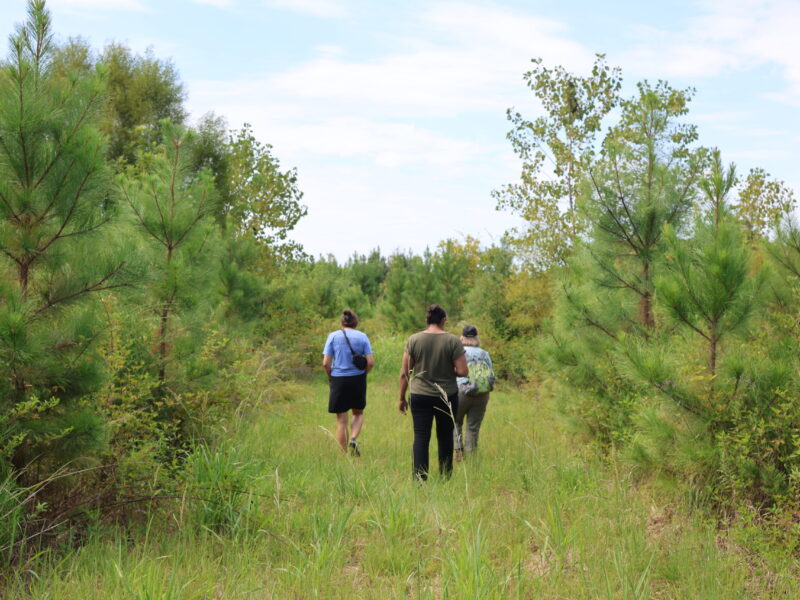
Foundation For The Carolinas and Our Environment
Foundation For The Carolinas’ mission includes helping philanthropists manage their charitable dollars. In recent years, FFTC expanded its focus to include civic leadership. This included efforts to promote environmental sustainability throughout the region.
Launching the Carolina Thread Trail
One of the Foundation’s first civic initiatives was related to environmental stewardship and green space.
Some of their early efforts to promote a greener environment were not yet bearing fruit. Then came a transformative idea: When Lucille Puette Giles bequeathed the foundation $35 million in 1996, her only stipulation was that the gift benefit Mecklenburg County. Since unclean air and polluted waterways don’t stop at county lines, Giles’ funds could be used in regional environmental efforts.
When the Foundation held town halls across the 13-county region to ask residents what they wanted, the resounding answer was “greenways.” An idea was formed.
FFTC funded an initial study, convened leaders and raised additional funding, resulting in plans for more than 1,500 miles of trails across 15 counties in North and South Carolina. The Carolina Thread Trail was born.
Today, the trail is a crown jewel of the Queen City and beyond.
Reducing Their Own Footprint
In the ensuing years, the Foundation continued to promote environmental stewardship. FFTC began focusing on energy reduction at its headquarters, reducing the average annual electrical consumption by nearly 900 MWh per year and converting incandescent and florescent lighting to LED. The Carolina Theatre, which is being restored by FFTC to be a hub for civic engagement, will also employ a sophisticated occupancy-based energy management system to reduce consumption.
Using ESG Investing to Affect Change
In 2021, Foundation for the Carolinas introduced the ESG Long-Term Growth pool, which uses primarily active investment managers that incorporate Environmental, Social and Governance (ESG) factors into their security selection process. As it pertains to the environment, the underlying managers engage with companies on topics such as carbon emission, biodiversity, deforestation, sustainable chemistry and sustainable solar.
The Foundation’s Investment Consultant, Mercer, takes a two-pronged approach to evaluating investment managers and their commitment to environmental factors.
- Mercer looks for integration, where responsible investing principles are a key tenet of the research process, rather than something that is only considered on the side or after the fact. An example would be considering the potential cost – through clean up and litigation – of an environmental disaster such as a train derailment or spill of hazardous materials. Not only does this greatly impact our environment through the water we drink and the air we breathe, but it can also severely affect the financial performance of a company.
- Mercer also looks for long-term track record of engagement, where the portfolio managers and research analysts at the asset management firm meet with company management and collaborate with them on specific ESG issues. The most common engagement tends to be around carbon emissions, where firms help companies set climate targets and collaborate on ways to achieve these goals.
The goal of engagement is to spark action and change through sustained company dialogue, proxy voting, shareholder resolutions, public policy and applied research. The majority of the managers Mercer selects produce an Annual Impact Report that showcases the outcomes of their engagements and highlights success stories amongst portfolio companies.
Asset manager Boston Common’s engagement with Kroger is one such success story.
When prioritizing engagements with portfolio companies, Boston Common looks for opportunities for a high-impact intervention. For example, they recognized that refrigerants have a much larger potential to warm our planet than carbon dioxide.
Kroger, a national grocery store chain, is one of the companies in Boston Common’s portfolio. Refrigerants are a core component of Kroger’s business, and they were receptive to working with Boston Common on a plan to shift to refrigerants with a lower potential for global warming. Kroger committed to implement rigorous processes to manage and report on leaks, while also establishing reduction goals.
Partnering for a Greener Tomorrow
As the Foundation continues to seek ways to protect and improve our environment, they are eager to work with fundholders and other community members to drive change. In addition to supporting environmentally focused nonprofits, fundholders can also invest their charitable assets in FFTC’s ESG Long-Term Growth pool. Another option is to donate to the Environmental Sustainability Fund, which allows our experts to award grants to local nonprofits working in the space. Contact FFTC’s philanthropic advisors at philanthropy@fftc.org to start a conversation.




